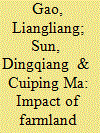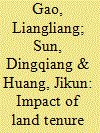|
|
|
Sort Order |
|
|
|
Items / Page
|
|
|
|
|
|
|
| Srl | Item |
| 1 |
ID:
158905


|
|
|
|
|
| Summary/Abstract |
The urban and rural dual structure is a defining characteristic of the social and economic development process in China. With rapid urbanization, remarkable development of agriculture and rural modernization, the relationship between urban and rural areas is undergoing significant changes in China. Using macro data, we find that the relationship between urban and rural areas started to change in 2010. The transition has mainly been reflected in three dimensions: agriculture, rural areas and farmers. First, agricultural versatility has gradually increased, and the number of participants in leisure agriculture and rural tourism has grown rapidly since 2010. Second, the rural employment rate has risen gradually, and the share of rural employees in the tertiary sector has grown markedly. Third, the urban–rural income ratio and consumption ratio have begun to decrease, and the levels of consumption of domestic tourism by urban and rural residents are becoming small.
|
|
|
|
|
|
|
|
|
|
|
|
|
|
|
|
| 2 |
ID:
164722


|
|
|
|
|
| Summary/Abstract |
There is growing concern that farmland transfers lead to less agricultural investment, which may adversely affect agricultural productivity growth in China. Prior research has primarily focused on the differences between owned cultivated land and rented plots, but little is known about how farmland transfers between relatives, which are popular in rural China, specifically affect agricultural investment. In this paper, we present a conceptual framework of transaction cost economics to compare different contracting strategies in China's farmland rental markets. As farmland rental markets in China are immature, land transfer between relatives establishes bilateral governance, which has the advantage of addressing the opportunistic activities of both parties and can ultimately increase investment by tenants. Based on data from two waves of household surveys, we empirically examine the impact of bilateral governance on the application of organic fertilizer, an indicator for agricultural investment. Our findings show that apart from economic factors, kinship is important to the functioning of farmland rental markets in rural areas.
|
|
|
|
|
|
|
|
|
|
|
|
|
|
|
|
| 3 |
ID:
156469


|
|
|
|
|
| Summary/Abstract |
The goal of this paper is to examine the impact of changes in China's rural land policy on agricultural investments. Dramatic changes occurred in China's rural land policies after 2000, including the extension of rural land contractual period, restriction of land reallocation among villages and villagers groups, elimination of agricultural taxes for responsibility land, and rapid development of rural land rental markets. These changes have given farmers more secure tenure on collectively controlled responsibility land and have strengthened farmers' income rights for responsibility lands, incentivizing them to increase their investments on responsibility lands. A panel data method was used to quantitatively investigate the impact of land policy changes on agricultural investment. We considered the application of organic fertilizer as an indicator for long-term agricultural investment, and compared the use of organic fertilizer between private plots and responsibility lands operated by the same household. The results showed that the difference in organic fertilizer use between private plots and responsibility land for the same household has become smaller from 2000 to 2008. Our findings suggest that recent changes in rural land policies have provided farmers incentives to increase land quality investment on their responsibility lands.
|
|
|
|
|
|
|
|
|
|
|
|
|
|
|
|
|
|
|
|
|